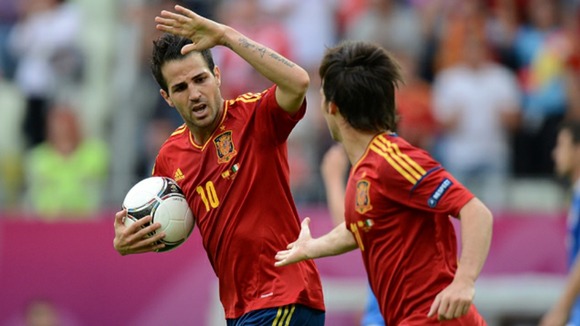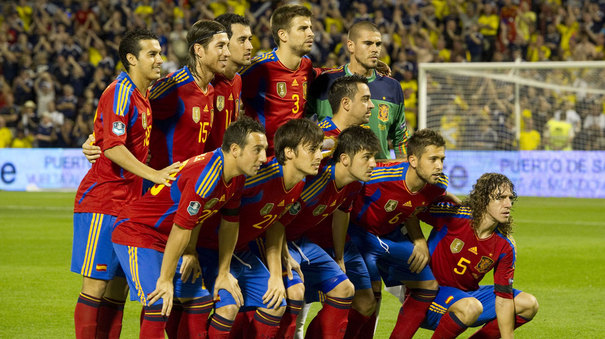It's a complaint voiced all too often in the modern age. From club managers and pundits on to the supporters who vote with their feet; international friendlies, what's the point? Not everyone buys into this line, but the Spanish Federation, the RFEF, continues to pour petrol on the critics' fire like few others.
On Wednesday night, we were treated to the Zlatan show in Stockholm. In New Jersey, Brazil were testing themselves against a rapidly improving Colombia. Holland v Germany never quite lived up to its billing, but where were the World and European Champions?
In Panama.
It's worth asking what they were doing there.
 |
| Pedro in action for Spain against Panama |
Ostensibly, they were competing for the Copa del Quinto Centenario. The what? Exactly. The Panamanian federation organised this to mark the 500th anniversary of Spain's conquistadores reaching the Pacific Ocean. Spain played their part to perfection by trampling all over the natives.
Trophy or not, this was just the latest in a line of questionable friendlies laid on by the RFEF since they conquered the world back in 2010. The players' reward for their historic achievements in South Africa was an August friendly in Mexico City before the season had even begun, to the fury of fans who wanted to see their heroes in action closer to home. A month later, an ill-starred jaunt to Buenos Aires saw them mauled at the hands of Argentina.
At least the argument could be made that this represented quality opposition, even if the interest levels of the players appeared questionable. But since then, matters have sunk into farce. Spain have taken the mantle of Brazil as the embodiment of the beautiful game, but their grand tour of meaningless exhibition games is outdoing even the worst of the Samba boys in the early Nike days.
Venezuela, Costa Rica, Puerto Rico, the USA; all tackled on the other side of the Atlantic. Even closer to home, they tend to travel. Indeed, they've played as many friendlies in St Gallen as they've played on home soil since claiming the world crown.
Much was made of several awful performances and defeats in these games, but in competitive games the Selección barely skipped a beat. Indeed, they qualified for this summer's Euros off the back of a second straight perfect campaign. But recently, there's been signs that the legginess is creeping into the games that matter.
In Tbilisi in September they were dreadful in their opening qualifier. A spirited Georgia side showed far more conviction and desire than their illustrious guests. They escaped with an unmerited 1-0 victory, before trouncing Belarus last month. But in the follow up, they found themselves on the back foot in Madrid as France fought back to earn a point.
At least last night's 5-1 win offered Vicente Del Bosque the chance to run the rule over some new options. Atlético Madrid's Juanfran got a roasting against Franck Ribery, but predictably fared much better this time out.
Benat of Real Betis has had an excellent start to the season, and it's to his credit that he didn't look at all out place alongside Sergio Busquets, Andrés Iniesta and, later, Cesc Fábregas. Athletic Bilbao's Markel Susaeta marked his debut with a goal from the bench. Del Bosque was quick to sing his praises when prompted, but in his customary fashion sought refocus attention on the team effort.
Raúl Albiol has barely seen game time at club level despite Real Madrid's injury crisis in defence. Indeed, when brought on for Cristiano Ronaldo at the weekend he played up front as a targetman. Here he partnered the Bayern midfielder Javi Martínez. A double for Pedro takes him to five goals in his last three internationals. David Villa took his international tally to 53 with his 299th career goal.
But in truth, how much of merit can be taken from a game like this? The answer must surely be: not a lot. Panama have reached their highest ever FIFA ranking of late as they scraped through to the final round of CONCACAF World Cup qualifying. But, not surprisingly, the gulf in class meant this was never going to be any sort of a contest.
In other words, this was another FIFA date that might have been put to better use. Del Bosque is too much of a gentleman to come out against his employers, but one wonders what he must make of it all. Come March, Spain host Finland before travelling to Paris for a game that should decide the group. No such jet lag for the French, who prepared last night with a 2-1 victory away to a strong Italy selection.
ORIGINAL ARTICLE HERE ON EIRCOM SPORTSHUB



